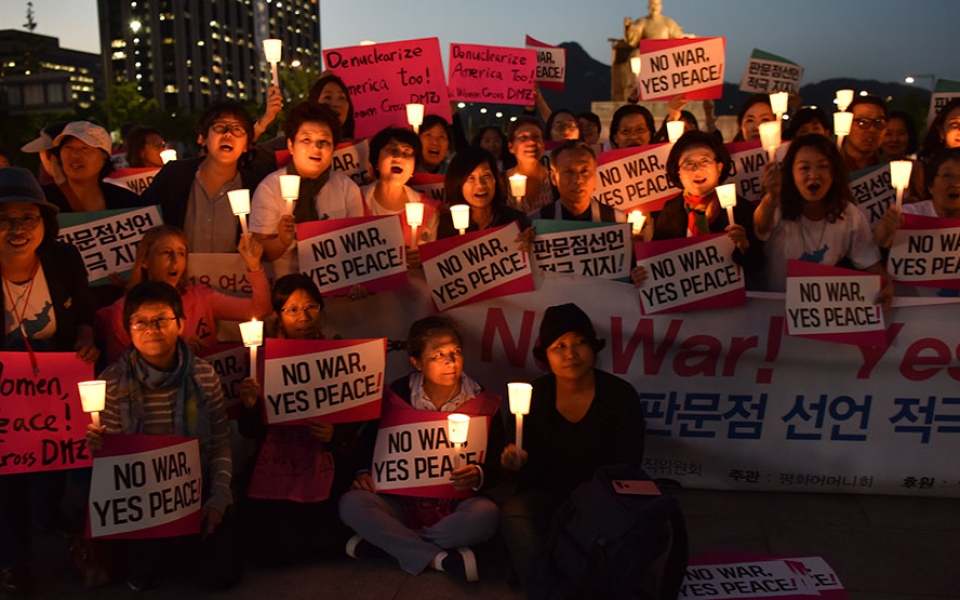The work, my friends, is peace, more than an end of this war – an end to the beginning of all wars, yes, an end, forever, to this impractical, unrealistic settlement of the differences between governments by the mass killing of peoples — Draft of undelivered Jefferson Day speech by President Franklin D. Roosevelt, 11 April 1945 (the day before his death)
The old ways of doing things have proven over and over that they do not work. We need a new vision of global peace, grounded in the intersectional experiences of people and the needs of the entire planet — Ray Acheson, Women’s International League for Peace and Freedom, 14 February 2022
On January 30, as Russian troops continued to mass on the borders of Ukraine, 100 courageous members of the Russian Congress of Intellectuals issued a “Statement of Peace Supporters against the War Party in the Russian Leadership.” Expressing “the point of view of that part of Russian society that hates war, and considers even the use of the military threat in foreign policy rhetoric a crime,” the signatories, led by human rights activist Lev Ponomarev, ask: “Do Russians need such a policy? Do they want war, and are they willing to bear the burden of it? Did they give the authorities the right to play such a game with their destinies?” “But,” they lament, “no one asks” the “citizens,” who are force-fed instead “only one point of view,” the “view of the supporters of the war.” And “from there”:
…direct military threats are heard, aggression and hatred towards Ukraine, America and Western countries… [And] the most dangerous thing is that war is presented as an acceptable and inevitable development of events.
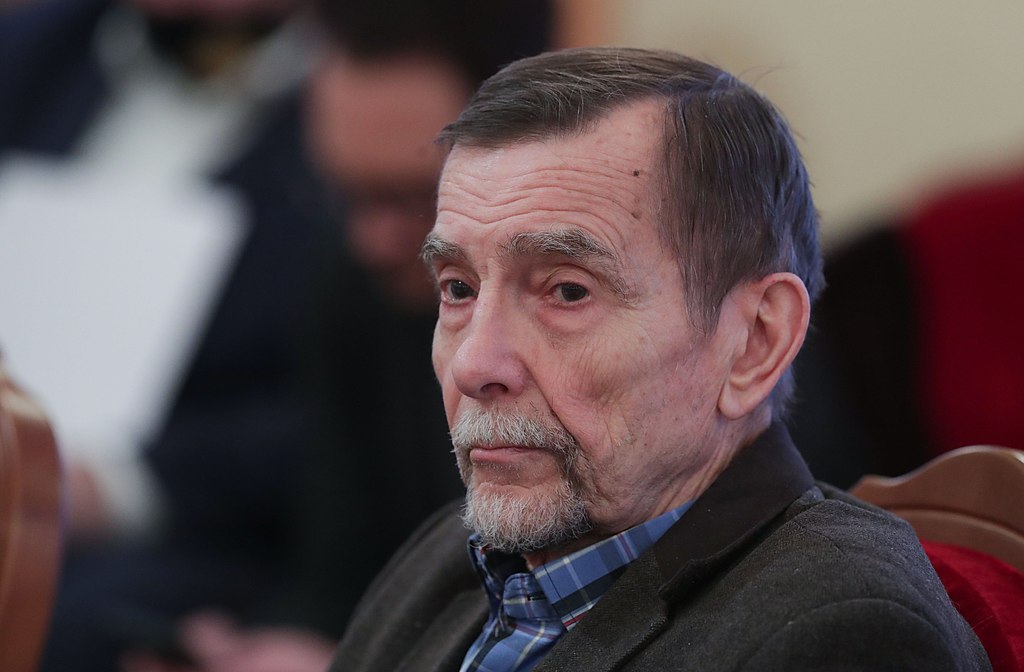
Lev Ponomarev, January 2022. (Photo by Duma.gov.ru, CC BY 4.0 <https://creativecommons.org/licenses/by/4.0>, via Wikimedia Commons)
The Statement is a powerful indictment of the corrupt authoritarianism of the interminable Putin era, a militarized, hyper-masculinized nationalism bred by the social-economic, ‘casino capitalism’ collapse of the 1990s and, in that same fateful decade, the beginning of NATO’s cancerous spread east to Russia’s borders. In June 1997, a high-level, bipartisan Open Letter to President Bill Clinton described the expansion of the Alliance as a “policy error of historic proportions,” a move – “opposed across the entire political spectrum” in Russia” – certain only to “strengthen the non-democratic opposition” and “undercut those who favor reform and cooperation with the West”. As Clinton’s Defense Secretary William Perry – who tried to delay the decision – now concedes:
We were on our way to forging a really positive and solid relationship, and then we announced we were going to expand NATO… That was the first move down the slippery slope.
Why was the post-Cold War peace imperiled? In a January 2022 interview with Hanna Notte of the Middlebury Institute of International Studies, Jack Matlock, US Ambassador in Moscow at the end of the Soviet era (1987-1991), recalled:
I testified in Congress against NATO expansion, saying that it would be a great mistake, and that if it continued, certainly it would have to stop before it reached countries like Ukraine and Georgia, that this would be unacceptable to any Russian government… But when I came out of that testimony, a couple of people who were observing said, ‘Jack, why are you fighting against this?’ And I said, ‘Because I think it’s a bad idea.’ They said, ‘Look, Clinton wants to get re-elected. He needs Pennsylvania, Michigan, Illinois; they all have a very strong East European [lobby]…’ Many of these [voters] had become Reagan Democrats on East-West issues. They’re insisting that NATO expand to include Poland and eventually Ukraine…
Notte also interviewed Thomas Pickering, Ambassador to Russia from 1993-1996, who stated that while he discharged his “duty” to “warn Washington about the impact [of expansion] on Russia,” he “had little expectation” his advice would be heeded, “given what I knew about the bulldozer and steamroller pushing this particular direction.” Pickering’s successor, James Collins (1997-2001), conceded to Notte that the rapid collapse of the Soviet Union encouraged “thinking in terms – as Americans often do – about wars we had won,” meaning “the idea was we would shape the future.” Or as President George H.W. Bush privately dismissed the preference of the last Soviet leader, Mikhail Gorbachev, for a denuclearized, demilitarized pan-European security order:
To hell with that! We prevailed. They didn’t.
My only critique, then, of the Congress of Intellectuals’ statement is that it fails to spread the blame for the current crisis to ‘the War Party’ – and its media allies – in the West, or to place the nightmare of Putin-ism in its fundamental context: the deliberate sabotage, and not by Moscow, of the project of building what Gorbachev called a “common European home” after the fall of the Berlin Wall. The intellectuals’ appeal for the “formation of a mass anti-war movement” in Russia could be directed with equal urgency to NATO countries, as well as Ukraine and Georgia, whose western-backed elites are clamoring to join the Alliance. As a February 1 “Statement by the Ukrainian Pacifist Movement” (alas far from massive) opens:
The people of our country and the entire planet are in mortal danger due to the nuclear confrontation between…East and West. We need to stop the build-up of troops, the accumulation of weapons and military equipment in and around Ukraine, the insane throwing of taxpayers’ money into the furnace of the war machine instead if solving acute socio-economic and environmental problems. We need to stop indulging the cruel whims of military commanders and oligarchs who profit from bloodshed.
Likewise, the Congress of Intellectuals’ assertion that, to be genuine, Russian “diplomacy cannot take any position other than a categorical rejection of such a war,” could be strengthened to urge the rejection by all states of war itself, the “scourge” from which the United Nations Charter pledged, three quarters of a century ago, to “save succeeding generations”. To quote the close of the Ukrainian Pacifist statement: “War is a crime against humanity. Therefore, we are determined not to support any kind of war and to strive for the removal of all causes of war.”

12/8/1987 George Bush Nancy Reagan and Raisa Gorbachev at the signing of the INF Treaty in the East Room (Reagan White House Photographs)
On January 31, the UN Security Council met to discuss the Ukraine crisis. Delegates had before them – but how many read it? – an Open Letter from Madeleine Rees, Secretary General of the Women’s International League for Peace and Freedom (WILPF), founded in 1915 to work for the abolition of human slavery to war. Entitled “Militarism is Killing Us All,” the letter insists that just as the “‘crisis’ has been created by the militarism of these countries”:
…their militarism cannot solve it. Leaving them to their devices enables a drift to armed conflict, potentially of nuclear war. This is not security. This is the madness of patriarchy and militarism.
Rees’ plea for the debate to “address the serious and underlying causes and not be abused by the UNSC to grandstand their militaristic rhetoric” fell on deaf ears, despite the fact that – starting with its milestone Resolution 1325 (2000) on Women, Peace, and Security (WSP) – the council has long acknowledged the need to instill new perspectives, and empower new players, to counteract the toxic effects of state and non-state violence in the global body politic. Yet in the case of the Ukraine crisis, Rees complains, the “militarization and co-option of the language of the [WSP] agenda by the UN, NATO, and the Ukrainian authorities means that women have to compulsorily register for military service;” and, she asks:
Where is the participation of women in the current discussions? Where is the participation of the non-violent people who will suffer most from an outbreak of war? Instead of moving for peaceful resolution and de-escalation, the members of the UNSC have flooded the region with weapons and sought to build on existing military alliances and tensions, as if 1914 taught us nothing.

The Russian delegation at the Hague Peace Conference, 1899; sitting second from left: Friedrich Martens (1845-1909), renowned Russian expert in international law. (Unknown author, Public domain, via Wikimedia Commons)
The years preceding 1914 saw an epic struggle between the forces of war and peace, with women’s movements at the fore of partially successful efforts – codified at the Hague Peace Conferences of 1899 and 1907 – to limit armaments and encourage arbitration. A third Hague Conference, scheduled for 1915, fell victim to what Canadian Prime Minister Wilfred Laurier called (as early as 1906) “the vortex of European militarism,” a black hole also consuming the radical ‘Advancement of Peace’ plan developed in 1913 by US Secretary of State William Jennings Bryan, envisioning – in conjunction with arms cuts – a mesh of bilateral treaties committing all parties to refer disputes to an independent International Commission. Though such arbitration would be non-binding, the hope, Bryan told delegates to an ‘Anglo-American Peace Banquet’ in New York on May 11, was that when:
…the nations of the earth have been knit together by agreements, incentives to war thus being removed, the danger of it will pass, and in time war will no longer be resorted to.
“Mr. Bryan’s speech was enthusiastically cheered,” the Manchester Guardian reported, and “the speakers who followed him – Lord Weardale for Great Britain, Sir George Reid for Australia, and Sir Edmund Walker for Canada – spoke in the same spirit and declared unhesitatingly for universal peace.” Yet these men were representatives of governments that would do nothing serious to further the plan, and of an Empire that continued (with all the others) a mad arms race to the cliff…
Rees’ haunting questions with relation to the Ukraine crisis – ‘where are the women, where are the non-violent people?’ – can be asked in hot and cold conflicts round the world, for example on the Korean Peninsula, where the intrepid anti-war group Women Cross DMZ [Demilitarized Zone] annually holds “events at the UN Commission on the Status of Women to highlight the urgent need for women’s inclusion in the Korea peace process, as called for” by UN Resolution 1325.
In 2019, Women Cross DMZ teamed with WILPF, the Korean Women’s Movement for Peace, and the Nobel Women’s Initiative to launch a new campaign: Korea Peace Now! Women Mobilizing to End the War; and while it is important to stress that the role of such groups, if finally able to fulfil their potential, would go far beyond intervening to keep militaries apart – would extend, instead, to building “a holistic peace that yields gender equality and genuine security” – one obvious consequence of failing to shift the patriarchal paradigm is how ludicrously difficult it can be to ‘make peace’ even in the minimal sense of preventing catastrophe. I recently heard a British citizen living in Ukraine tell the BBC he did not plan to leave, as advised by the Foreign Office, because he thought the situation was “like two footballers butting heads, and I’m waiting for the referee to separate them.” Who, in this case, would that be?
Absent such an arbitrator, war scares inevitably generate – on both sides of the debased coin – an almost hallucinogenic, dehumanizing, self-righteous hatred of the Other. In a February 9 article entitled “I’m a conflict mediator. This is a way out of the Ukraine crisis,” Gabrielle Rifkind succinctly summarized the “current western narrative”: “Russia is a Machiavellian power with an expansionist agenda.” “That view,” she warns:
…is shaping our response: we are matching Vladimir Putin’s aggression, meeting strength with strength and threats with threats. But what if we tried to get inside the mind of the enemy, and ask what was motivating the aggression? In doing so, could we break this cycle – and offer Putin a way out, too?
Rifkind cites two voices of reason: Dr. Anatol Lieven of the Quincy Institute for Responsible Statecraft, whose recommendation for ‘a way out’ of the military mess – Ukrainian neutrality – I endorsed last month; and French President Emmanuel Macron, whose conciliatory and respectful “remarks on Russia,” according to one report, “set alarm bells ringing” in Western capitals apparently not holding these truths to be self-evident: “Russia is European,” and “whoever believes in Europe must know how to work with Russia and find the ways and means to construct the European future among Europeans.”
Macron also urged “the strict and total” implementation of the February 2015 ‘Minsk II’ ceasefire agreement seeking to end months of fierce fighting between Ukrainian forces and pro-Russian separatists in the eastern Donbas region. Brokered by France and Germany, Minsk II mandates elections on the “special status” – significant autonomy – of the self-declared ‘People’s Republics’ of Donetsk and Luhansk, an area covering roughly one-third of the Donbas (though rebel leaders claim jurisdiction over the whole region). In return, Kyiv would achieve “restoration of full control over the state border,” a process to “begin on the first day after the local elections and be completed after a comprehensive political settlement,” codified in a “new constitution coming into force by the end of 2015, providing for decentralization as a key element.”
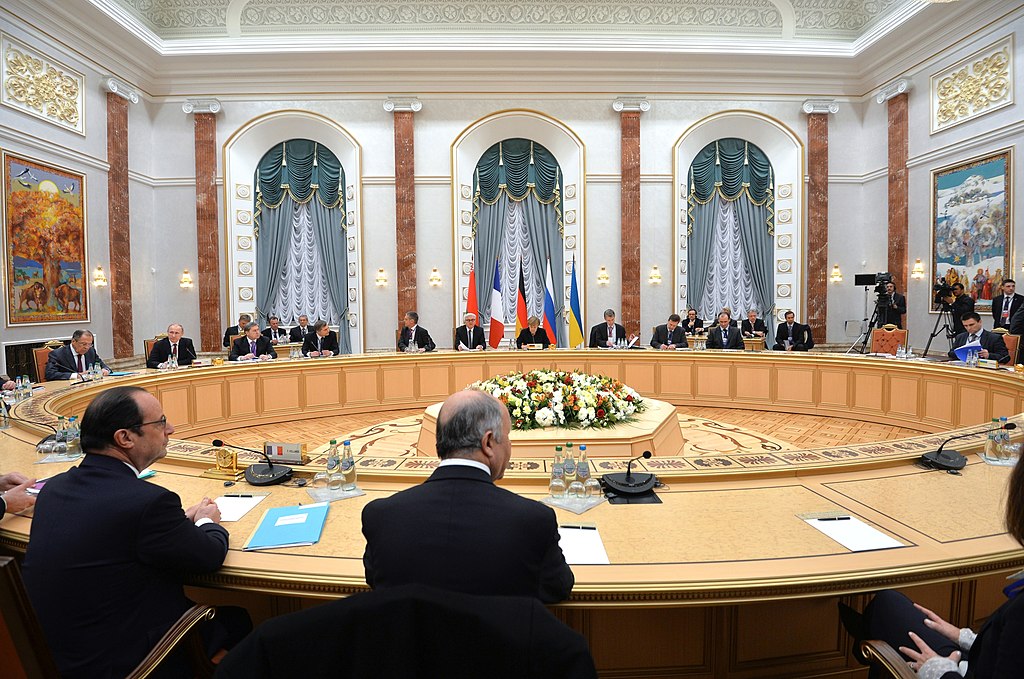
Angela Merkel, Francois Hollande, Petro Poroshenko and Vladimir Putin take part in the talks on a settlement to the situation in Ukraine, Minsk, Feb. 2015. (Photo: Russian Presidential Press and Information Office)
When the agreement was unanimously approved in Security Council Resolution 2202 (2015), America’s UN Ambassador Samantha Power described its implementation as “the only way out of this deadly conflict.” But while rhetorically supportive, Kyiv argues the elections cannot be held while illegal and mercenary forces remain and ‘low-level’ fighting (claiming 14,000+ lives, with brutal militia activity on both sides continues, even though the fighting is fueled precisely by the failure to hold elections and decentralize the state.)
On February 15 the Russian parliament (Duma) appealed to President Putin to recognize the independence of the Donetsk and Luhansk Republics. On February 21, Putin agreed, signing a decree accepting the Republics’ claim to the whole region, and dispatching ‘peacekeepers’ across the border after rebel leaders (ordering a partial civilian evacuation) claimed Ukrainian forces were preparing to attack. Given the number of Russian troops nearby, the claim was preposterous, though Russia experts like Nina Khruscheva – no apologist for the Putin regime – suspect Moscow originally dispatched forces to deter Ukrainian President Volodymr Zelensky, “encouraged by the West and Western military support,” from “trying to take the territories by force.”
But at dawn on February 24, it was Russia that began what Putin called “a special military operation,” centered on the Donbas but involving attacks across Ukraine, to take by force territories it refused to risk ever losing to NATO. Thus, at the time of writing in late February, a combination of Kyiv’s refusal to swallow the bitter pill of Minsk-II and NATO’s ‘non-negotiable’ delusions of expansionary grandeur had begun to yield its gruesome harvest: the bloody dismemberment of Ukraine, and the possible ignition of a broader conflagration.
These two self-defeating strategies, of course, are intimately entwined, as granting autonomy to Donetsk and Luhansk, while preventing their secession and restoring Ukrainian territorial integrity – with the glaring exception of Crimea, annexed by Russia in 2014 – would not just dim but doom prospects of NATO accession, with the autonomous regions certain to either block such a move or violently secede. Even the prospect of such division or disorder would seem to preclude Ukrainian membership under NATO’s own criteria, set out in a 1995 “Study on Enlargement” which noted that “states which have ethnic disputes…or internal jurisdictional disputes must settle those disputes by peaceful means,” and insists that “resolution of such disputes would be a factor in determining whether to invite a state to join.” In this case, ‘peaceful means’ could only have meant Minsk-II, yet Minsk-II could only have meant the end of any bid to join NATO – despite which, since 2019, the Ukrainian constitution has enshrined NATO membership as a “strategic” goal, deemed essential to preserving the national unity its pursuit has now shattered! Indeed, Crimea was annexed primarily to prevent the future absorption into NATO of Russia’s naval base in Sevastopol, home port of its Black Sea Fleet, operated under lease from Kyiv from 1992 until the overthrow – encouraged and influenced by Washington – of pro-Moscow President Viktor Yanukovych 22 years later.
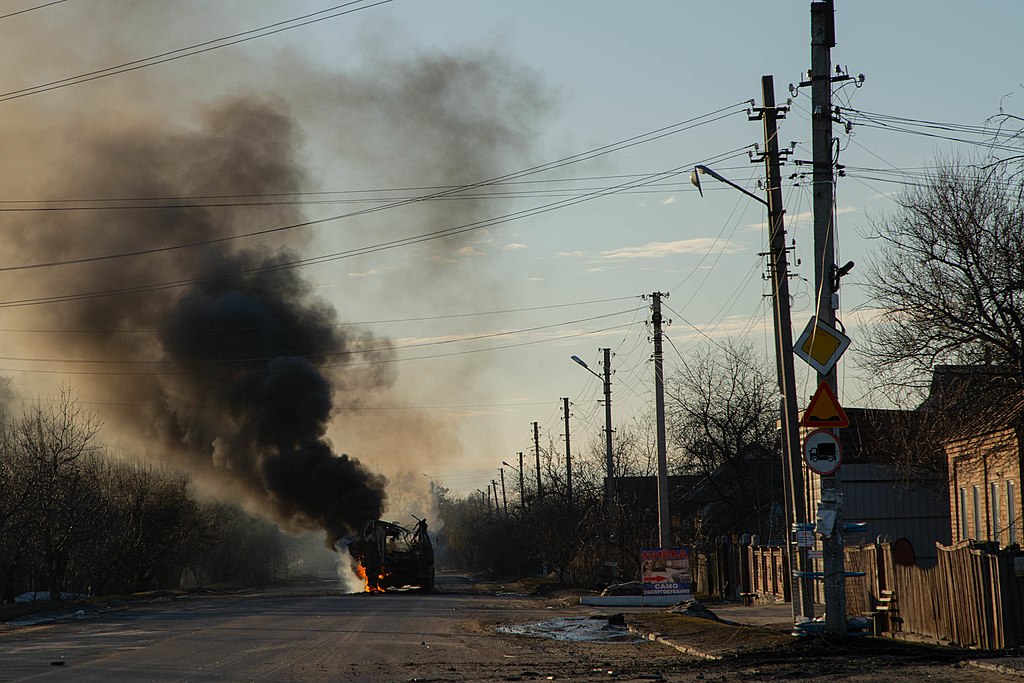
A bus burns as Russia invades Ukraine on 24 February 2022, on a road from Kharkiv to Kyiv. (Yan Boechat/VOA)
In 2006, Yanukovych’s predecessor, Viktor Yushchenko – strongly encouraged by the George W. Bush Administration – requested a Membership Action Plan (MAP) from NATO. While, due mainly to French and German objections, this was not forthcoming, Alliance leaders at their 2008 Bucharest Summit “agreed that these countries will become members”: a decision described by then US Ambassador to Russia William Burns as crossing “the brightest of all redlines for the Russian elite (not just Putin).” And it was surely with a desire to stop the juggernaut that Yanukovych in 2010 proposed his country become neutral.
Anxious to quash the outrageous suggestion, Javier Solana – NATO Secretary-General in the decisive expansion years of 1995-1999 – and Strobe Talbott – US Deputy Secretary of State in the Administration that assured Gorbachev the Alliance would never “inch” east – addressed the Diplomatic Club in Kyiv on 30 March 2010. In light of the ‘destiny games’ now being played in the divided heart of Europe, a summary of their slap-down makes for galling reading:
Answering a question about how he saw the neutral status of Ukraine…Solana said he thinks that neutrality is a concept of the past, not present, day. Ukraine and NATO are involved in active partnership. The two sides are cooperating on such a scale that Ukraine cannot be regarded as neutral…
Well, it is certainly true, as Timothy Garton-Ash recently quipped, that while “Ukraine is not in NATO…NATO is in Ukraine.” The summary continues:
Talbott noted that with time the concept of neutrality is starting to lose its topicality. In his opinion, even the European countries that have not joined NATO will return to the issue.
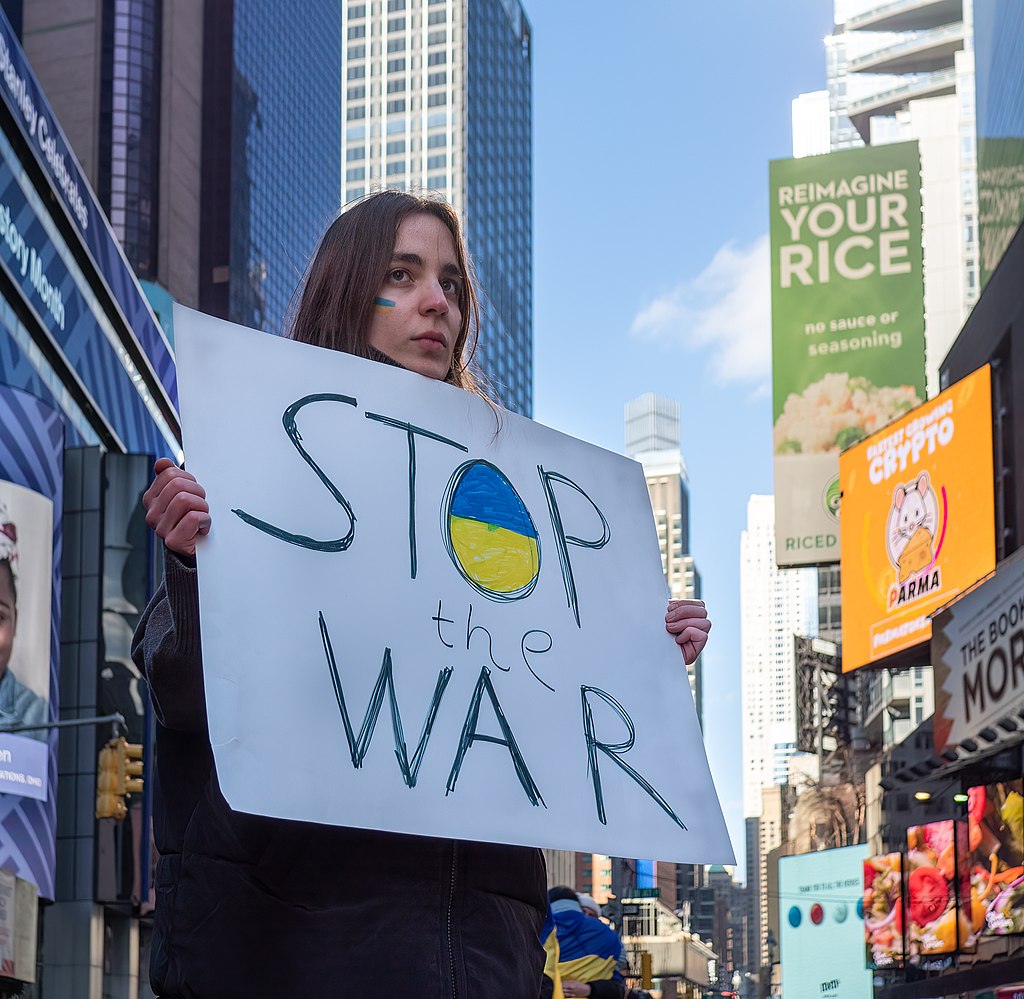
Protester in Times Square, 26 Feb 2022 following the Russian invasion of Ukraine (Photo by Rhododendrites, CC BY-SA 4.0, via Wikimedia Commons)
Well, if two of those ‘holdouts,’ Austria and Ireland, had gone with the testosterone flow and joined the world’s only nuclear-armed Alliance, they certainly would not have spent the last decade leading diplomatic efforts to negotiate the new UN Treaty on the Prohibition of Nuclear Weapons (TPNW). Vienna has long-advocated a Nuclear Weapon Free Zone (NWFZ) in Europe, and in 2010 commissioned an independent study which concluded:
NWFZs are time-honoured ways to create regional confidence and solidarity, to strengthen the non-proliferation regime…and de-legitimate nuclear weapons. The pivotal function of this project, however, is its chance to stimulate civil society and create a momentum that is not easily controlled by the powers that be.
Far from losing its ‘topicality,’ a growing body of scholarship supports not just Ukrainian neutrality, to defuse today’s loudest ticking Time-Bomb, but a ‘belt of neutrality’ finally separating the head-butting ‘teams.’ Michael O’Hanlon, for example, arguing in a 2017 Brookings Institution study that “NATO expansion has gone far enough,” believes “now is the time for Western nations to negotiate a new security architecture for neutral countries in eastern Europe to stabilize the region and reduce the risks of war with Russia.”
If, after the Russian invasion of Ukraine, such a neutral zone can still be built, it might yet serve as the foundation for the absurdly belated construction of a ‘Common European Home.’ To be truly inclusive, however, the ‘new architecture’ must be designed and built, not by the patriarchal ‘powers that be’ – to hell with that! – but by new hands, in new ways, to new ends.
Sean Howard is adjunct professor of political science at Cape Breton University and member of Peace Quest Cape Breton and the Canadian Pugwash Group. He may be reached here.


